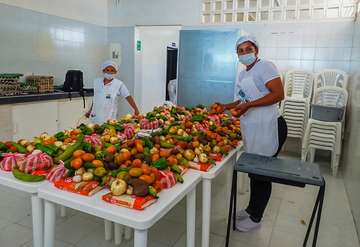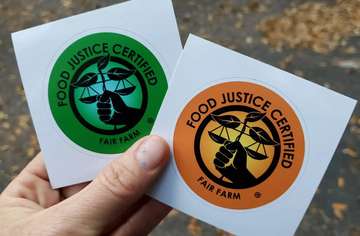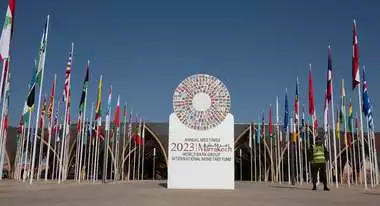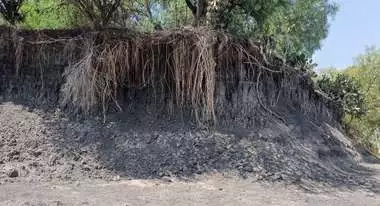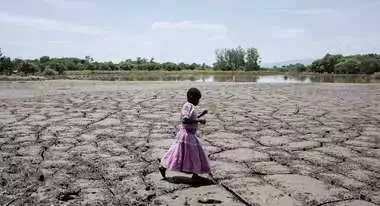Decolonising the Food System through Nongovernmental Organisations
NGOs play a crucial role in overcoming the heritage of unequal power relations and creating more humanitarian structures from the field to the food bowl.

The aim of this article is to look at the importance of breaking with colonial practices of power and violence in the world food system through the work of NGOs, that is, the key role that these organisations play to achieve a more just and dignified food system, from production to distribution of resources. The question that guides the research is: what is the importance of promoting decolonization processes through NGOs on a global scale in the food system?
The FAO defines food insecurity as a "lack of regular access to sufficient, safe and nutritious food for normal growth and development and for an active and healthy life”. It points out that "this may be due to lack of availability of food and/or lack of resources to obtain it" (FAO, 2013).These are the guidelines for the work of NGOs in the food sector. However, they do not explain the nature of the colonial conditions under which food is produced and consumed at the cost of exploiting labor or the environment.
There are a number of contradictions and challenges in the global food system, one of which is inequality in food production and distribution. Large agribusiness corporations control vast tracts of land and dominate supply chains and the ability of people to gain equitable access to sufficient and nutritious food.
This article aims to shed light on the importance of NGOs to break with such practices of power and social and environmental violence in a colonial capitalist system, particularly in their work in the food system.
NGOs play an important role in mitigating problems associated with the global food system, for instance through humanitarian contributions, community support or project funding. However, the interests that these organizations are aligned with are often problematic: many receive funding from large corporations and governments that are not always committed to environmental stewardship. This can limit their ability to address or divert their interest from the systemic and structural roots of the global food system.
The fact that NGOs were founded at a historical moment when former colonies gained independence from colonial powers gives them an important responsibility not to promote or perpetuate the colonial processes that are at the root of many current forms of violence, both in the food system and in social relations at all levels.
Colonialism can be understood as an asymmetrical relationship of domination that developed from the capitalist centers to the territories that were forced to become capitalist peripheries. However, even when colonialism is thought to have ended in peripheral regions such as Latin America or Africa, internal mechanisms of colonial structures still prevail that maintain the colonizer's domination over society, nature, or food. One example is “the international system of intellectual property rights based on patents and plant variety protection, which deprives indigenous farmers of the genetic diversity that their communities have created and freely shared over millennia” (Agricultural Justice Project, 2023).
Another example is the labor exploitation in agriculture of migrant workers or the dispossessed, who face degrading working conditions and low wages. In the United States, seven of the ten lowest paid jobs are in the food sector (Patel 2020). In addition – and this is typical of a capitalist system based on overproduction – agriculture is highly industrialized in monocultures that damage human health and the ecology through pesticides, herbicides and chemical fertilizers.
All this takes place in a context in which the Secretary General of the United Nations (UN), Antonio Guterres, recently stated that "the era of global warming has ended; the era of global boiling has arrived". Likewise, Alain-Richard Donwahi, former Minister of Water and Forests of Côte d'Ivoire and President of the COP15 of the UN Convention to Combat Desertification, states: "The world is likely to face major food disruptions long before temperatures rise to reach the 1.5°C target. We are at a possible point of no return, a tipping point in the socio-environmental conditions of our planet.”
From the perspective of economist Raj Patel, the food system must be understood beyond supply chains, as it is really the entire interconnectedness of the elements that make it possible (Patel, 2020). Patel states that it is essential to understand that "hunger is not cured by food at all, because hunger is the result of long histories of exploitation and poverty, and so you can't solve poverty by, you know, giving crumbs from the table", i.e. "it's the whole package, and it's not just that these are survival programs, but it's survival until revolution" (Patel, 2020).
Promoting Food Sovereignty
Therefore, to work towards decolonization NGOs should emphasize the need to achieve food sovereignty, that is, to achieve access to food through local production and not through the purchase of food in commercial chains where it is a commodity.
The Center for Global Development has found that affected populations are not well represented because NGO boards prioritize administrative management and fundraising over expertise in the field (Rosa and Sáez, 2021). This not only hampers the organizations' own capacity to respond to and make decisions in the face of crises, but also removes the link with affected populations and thus the possibility for effective evaluation of their work, since they lack the perspectives that can critically point out racist, patriarchal or colonial actions.
In this sense, decolonization implies that humanitarian workers themselves abandon the position of "development missionaries", characterized by a deeply individualistic approach based on bringing "welfare" to affected communities as a form of personal self-realization and not of justice, while avoiding criticizing and modifying capitalist structural mechanisms of exploitation.
Also, NGOs should be more linked to social movements than to large corporations, not only in terms of funding, but also in their mission, vision and decisions. It is even better if these NGOs come directly from these social movements, such as the Agricultural Justice Project.
An important initiative has been AJP's questioning of food justice certification standards, organizing international exchanges on organic agriculture and fair trade, such as the IFOAM Organic Trade Conference in Bangkok, Thailand, to build cooperation between the organic and fair trade movements, and to strengthen the voice and participation of indigenous peoples.
There is also a need to disseminate information, not only to one group interested in the issue, but to the whole population in different contexts, i.e. "how to get people to care about the inequalities and injustices from field to farm to processing to distribution to retail to eaters and communities that are food insecure" (Whose Voice is Missing).
The idea is not to demonize all companies or corporations in the food sector, but to bring local companies closer to the farmers to avoid the intermediation that leads to rising prices and reduced payments to farmers. "Whose Voice is Missing" is a public education project focused on grassroots solutions to inequality and injustice such as "skewed power dynamics, a culture of division, and the prioritization of profit over people, animals, and the planet” (Whose Voice is Missing).
Another fundamental action NGOs can carry out is to make more visible the process of production, packaging, transportation, consumption and even disposal of food on an international scale, so that the focus shifts away from profitability and towards sustainability. For example, showing how "a fruit that grows under the Argentine sun is harvested and sent to Thailand, where it is preserved, processed and vacuum-packed" (Moyano, 2020), i.e. this fruit has traveled to the other side of the world just to be packaged.
Then, "this fruit travels to the United States, where it is sold in a major supermarket chain. Someone buys it and, before leaving the parking lot, opens the container and takes two bites of the four pear segments inside. He throws the empty container in a trash can, gets in his car and drives away” (Moyano, 2020).
Finally, at a time when food prices are reaching a historic peak, NGOs should participate in the promotion of popular agrarian reforms, which, in the words of Jaime Amorim, political coordinator of Via Campesina South America, will make it possible to "guarantee technical assistance, organic seeds, production of organic inputs" and a substantial change in the agrarian economy, which today is oriented towards large-scale production.
Food production and the world food system must respond to current and future demand, but so far "myriad governmental and international policies have had the overall effect of lowering the prices paid to farmers and raising the prices paid by people who have to buy food”.
Changing the System
The true intergenerational and transgenerational concern should be to demand a system aligned with the needs of the population and the regenerative capacity of the planet, and not with the profitability of an industrialized system of massive and internationalized food consumption, regardless of the pollution, waste, transportation and health consequences of these processes.
That does not mean discrediting the contribution of food security projects in recent decades, but rather promoting a broader complementarity of security with food sovereignty through the modification of unequal power structures. Here, NGO workers have not only a greater scope of action for implementing projects, but also the capacity and willingness to support the community autonomy.
The decolonization of NGO work involves the struggle against all the forms of violence that the capitalist system exerts against peasants, women, the environment and children, the same violence that the neoliberal model caused decades ago. Whether in the legal, media, educational or social sphere – for mobilization or solidarity action it is essential to understand that the battlefield against agribusiness is all over the world and to find allies in any field to collectivize the struggle.

The author is a Mexican activist and internationalist with a BA in International Relations from the Faculty of Political and Social Sciences of UNAM, the National Autonomous University of Mexico. She is part of the of the Environmental Analysis Group (GAA) in Tejiendo Organización Revolucionaria (TOR). Research interests include socio-environmental, energy and security issues in the Greater Caribbean and Latin America, on which she has published two articles.
References:
- Agricultural Justice Project, Website, https://agriculturaljusticeproject.org/
- ECLAC. 30 May 2023. Development cooperation is fundamental to foster international and regional solidarity, and is a solution to face global crises. United Nations [Press Release]. Available at: https://www.cepal.org/es/comunicados/la-cooperacion-desarrollo-es-fundamental-fomentar-la-solidaridad-internacional-regional
- Cerezal, Pablo. 18 July 2022. Brief history of international cooperation. Ethic. Available at: https://ethic.es/2022/07/breve-historia-de-la-cooperacion-internacional/
- Firoze Manji, Carl O'Coill. 3 July 2002. The Missionary Position: NGOs and Development in Africa. International Affairs (Royal Institute of International Affairs 1944-), Vol. 78, No. 3. Available at: https://www-jstor-org.pbidi.unam.mx:2443/stable/3095891
- González Casanova, Pablo. "El colonialismo interno" in, Pablo González Casanova, Sociología de la Explotación. CLACSO, Consejo Latinoamericano de Ciencias Sociales, Buenos Aires, Argentina, 2006, p. 186. Available in: http://bibliotecavirtual.clacso.org.ar/ar/libros/secret/gonzalez/gonzalez.html
- Gordillo, Gustavo & Méndez Jerónimo Obed. 2013. Seguridad y soberania alimentaria. FAO. Available at: https://www.fao.org/3/ax736s/ax736s.pdf
- Herrera-Camargo, Lyda Marcela. 3 November 2022. La igualdad en la Agenda 2030: un reto histórico del Estado. Escuela Superior de Administración Pública. Available at: https://revistas.esap.edu.co/index.php/admindesarro/article/view/828
- Oxford Real Farming. 2 February 2021. Against Philanthropy: The Role of Foundations in Colonising the Food System. Post Carbon Institute. Available at: https://www.youtube.com/watch?v=oekGymm1rYg
- Perez Rodriguez, Vivian. 2013. La cooperación internacional al desarrollo y la evaluación de sus políticas: una aproximación teórica. Latin American Council of Social Sciences. Available at: https://biblioteca.clacso.edu.ar/Cuba/ciei-uh/20141013111239/LACOOPERACIONINTERNACIONALALDESARROLLOYLAEVALUACIONDESUSPOLITICAS.pdf
- Post Carbon Institute. September 15, 2020. Raj Patel: Fragility in Food Systems. Post Carbon Institute. Available at: https://www.youtube.com/watch?v=lbRj28Be50U
- United Nations. 27 July 2023. Hottest July ever signals 'era of global boiling has arrived' says UN chief. United Nations. Available at: https://news.un.org/en/story/2023/07/1139162
- Worden, Rose and Patrick Saez. 22 June 2021. Decolonizing the Humanitarian Nonprofit Sector: Why Governing Boards Are Key. Center For Global Development. Available at: https://www.cgdev.org/blog/decolonizing-humanitarian-nonprofit-sector-why-governing-boards-are-key
- Yerramilli, Pooja. 22 February 2021. To Decolonize Global Health, We Must Examine the Global Political Economy. Think global Health. Available at: https://www.thinkglobalhealth.org/article/decolonize-global-health-we-must-examine-global-political-economy
- Moyano, Rafael "El mundo que tuvimos", 03 October 2020, El País. https://elpais.com/elpais/2020/10/01/3500_millones/1601544820_414049.html
